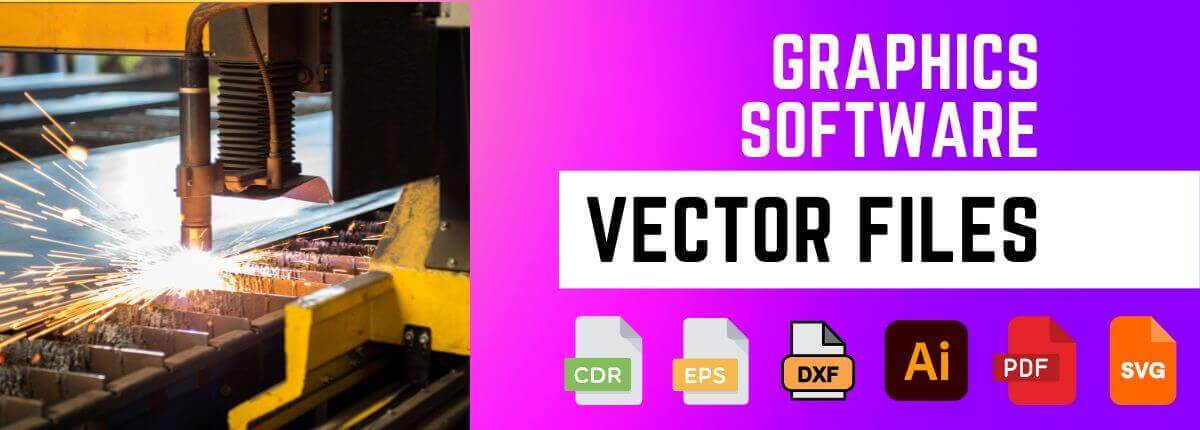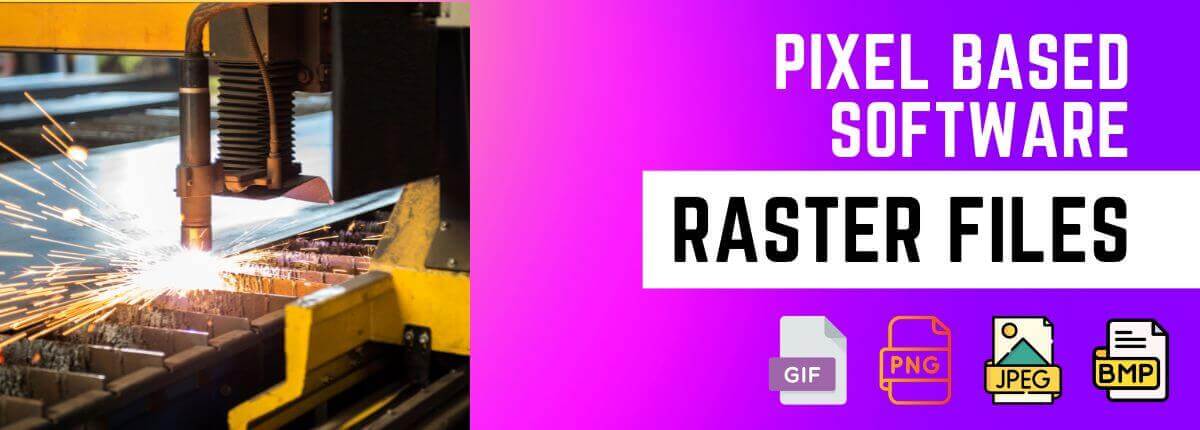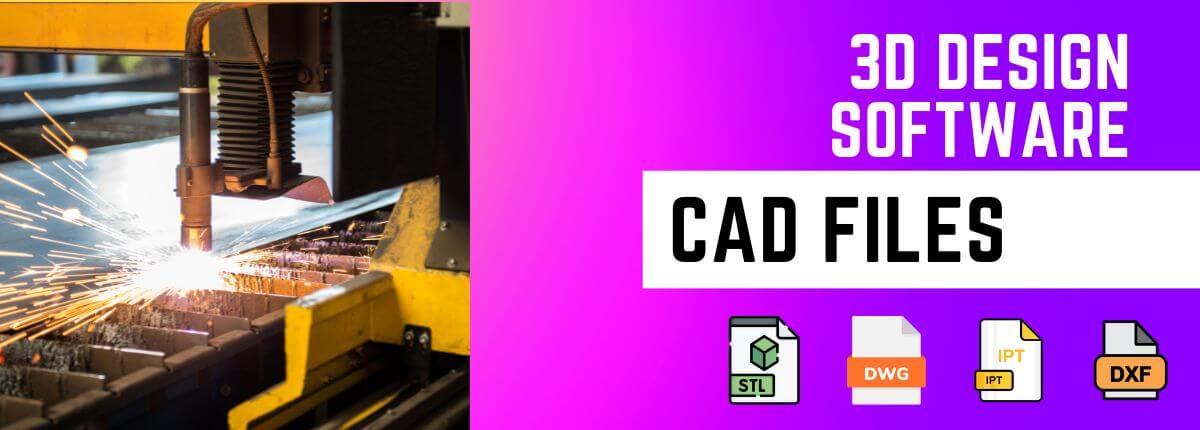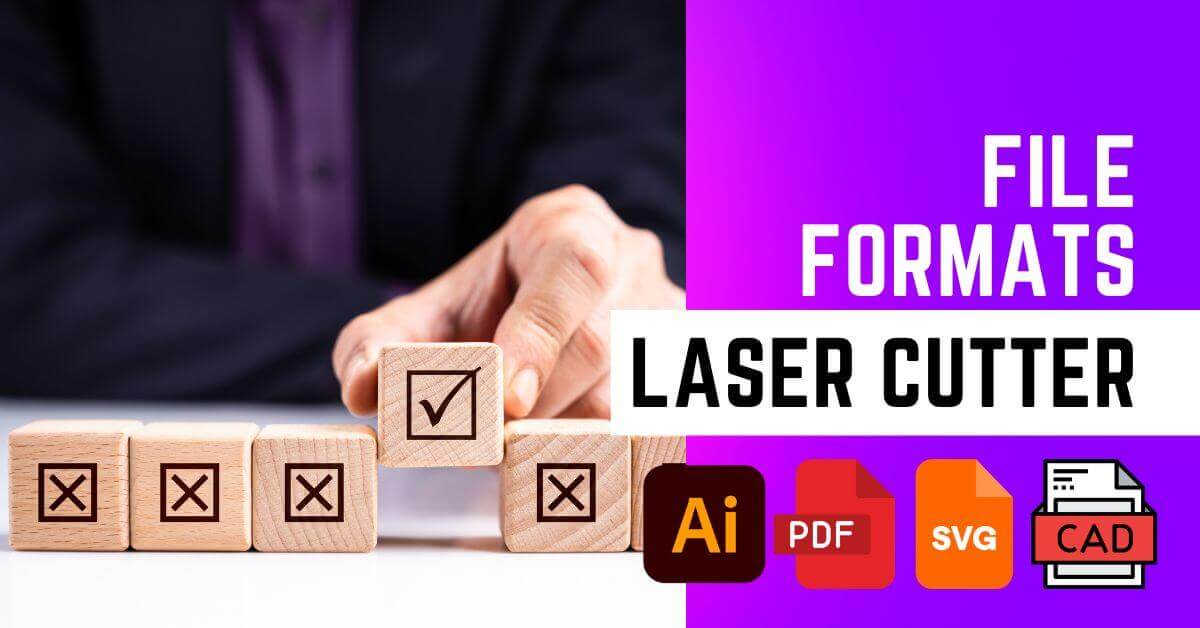Laser cutters use computer-controlled light beams to cut materials: such as wood, acrylic, and metal. To operate a laser cutter, you need free laser cut files or digital laser cutter file types that contain the design you want to cut or engrave.
Not all file formats are suitable for these cutting machines. To begin cutting, having the appropriate file format is necessary.
This article will cover various file type attributes used in laser cutter machines. Additionally, we will provide you with free sources for laser cutters that are suitable for beginners to use in their work.
What are Laser Cutter Files?
The laser cutter file is a digital file that contains the cutter pattern or design. These files are Vector, Raster, or CAD files. You can use computer software such as Adobe Illustrator, CorelDRAW, or AutoCAD to create these file designs.
Specific tasks require specific file formats and use for each software. For designs that require precise cutting or printing, vector files are generally the preferred choice. Raster images, on the other hand, tend to be preferred for displaying on screens.
Laser Cutter File Types In Detail
Vector Files

To create vector files for laser cutting, you typically use vector graphics software such as Adobe Illustrator or CorelDRAW. These files contain points, lines, curves, and shapes that enable precise cutting. Vector files can be easily scaled up or down without losing quality because they are resolution-independent.
Examples of vector file formats include SVG, DXF, and AI.
Raster Files

Bitmap images, known as raster files, are created with programs like Adobe Photoshop and consist of pixels. Unlike vector files, they are resolution-dependent, so scaling them up can degrade image quality. Laser cutting often uses vector files, but raster files are best for screen presentations to create intricate patterns and images.
Examples of raster file formats include BMP, PNG, and JPEG.
CAD Files

Designers use computer-aided design (CAD) software to create 3D models, which generate CAD files. Industrial laser cutting can benefit from these files as they enable the creation of intricate and complex designs. CAD files are the ideal choice for cutting complex shapes that require a high degree of precision.
You can export CAD files in several formats, such as STEP, STL, OBJ, and IGES.
Laser Cutting File Format Chart
| File Format | Type | Description |
| SVG | Vector | Scalable Vector Graphics file format |
| DXF | Vector | Drawing Exchange Format used in CAD programs |
| AI | Vector | Adobe Illustrator file format |
| EPS | Vector | Encapsulated PostScript file format |
| Vector | Portable Document Format | |
| CDR | Vector | CorelDRAW file format |
| BMP | Raster | Bitmap image file format |
| PNG | Raster | Portable Network Graphics file format |
| JPEG | Raster | Joint Photographic Experts Group file format |
| GIF | Raster | Graphics Interchange Format file format |
| STL | CAD | Standard Triangle Language file format |
| DWG | CAD | Drawing file format used in AutoCAD |
| DXF | CAD | Drawing Exchange Format used in CAD programs |
| IPT | CAD | Autodesk Inventor Part file format |
| IGS | CAD | Initial Graphics Exchange Specification file format |
| STEP | CAD | 3D CAD file format. |
How to Choose the Right File Type for Laser Cutting?
Choosing the optimum file type for laser cutting depends on the design or software that you are using. Vector graphics formats like SVG, Ai, and DXF are excellent for 2D designs, while 3D designs may require files like STL.
To create complex 3D designs, you may need to use a variety of file formats in combination to achieve your desired results.
Tips for Preparing Laser Cutter File Types
To ensure optimal results when using a laser cutter, follow these tips for preparing your files:
- Convert text to outlines to prevent issues with font recognition.
- Check the line thickness for the material.
- Group objects to avoid unintended movement during cutting, but remember to ungroup them before making changes.
- Check for overlapping lines that can cause incomplete cuts or burns.
- Use proper file naming conventions by avoiding spaces or special characters and using underscores or hyphens instead.
- Consider the width of the kerf during designing files.
Free Laser Cut Files Websites For Beginners
You can access these websites for free laser-cut files.
- https://www.ponoko.com/free-laser-cutting-files-templates
- https://designbundles.net/free-design-resources/free-laser-cutting-files
- https://www.librarylaser.com/new-laser-cut-files
- https://www.troteclaser.com/en-us/learn-support/laser-projects
- https://www.freepatternsarea.com/free-patterns-templates/
- https://www.epiloglaser.com/resources/sample-club.htm
- https://www.vecteezy.com/free-vector/free
- https://www.freevector.com/
- https://www.freepik.com/
- https://masterbundles.com/free/
- https://www.dxfdownloads.com/category/free/
- https://www.dxfforcnc.com/collections/free-dxf-files
Conclusion
This article discusses laser cutter file types and their uses. Laser cutters use digital files that contain the design or pattern to cut or engrave materials.
Vector, raster, and CAD files are the three main types of laser cutter files. For precise cutting, vector files are the best option. A raster image file format is best for visualizing and analyzing designs on a screen. And industrial laser cutting benefits from CAD files for intricate designs.
The article also provides tips for preparing files and a list of websites for free laser-cut files suitable for beginners.
FAQs (Laser Cutter File Types)
1. Can I use any laser cutter file types?
Ans: No, not all file formats are compatible with laser cutters. Ensure the manufacturer’s guidelines or consult with the laser cutter operator to confirm that the file format is supported.
2. What should I do if the laser cutter operator cannot open my file?
Ans: You should review the manufacturer’s guidelines, consult with the operator, and try converting the file to a compatible format.
3. Are there any file size limitations for laser cutter file formats?
Ans: Yes, some laser cutter software may have file size limitations. It’s necessary to check with the manufacturer or operator for specific guidelines.
4. What is the main difference between raster and vector file formats?
Ans: The main difference between raster and vector file formats is that raster files are made up of pixels, while vector files are lines and curves.
A raster file is best for screen presentation, while a vector file is best for printing tasks.
5. Can I use a PDF file for laser cutting?
Ans: Yes, you can use PDF files for laser cutting, but they need to be vector-based instead of raster-based.
6. Can we use free DXF files for laser cutting?
Ans: Yes, you can use free DXF files for laser cutting.

